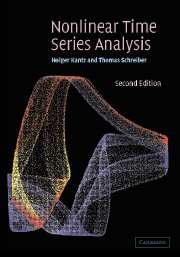Book contents
- Frontmatter
- Contents
- Preface to the first edition
- Preface to the second edition
- Acknowledgements
- I Basic topics
- 1 Introduction: why nonlinear methods?
- 2 Linear tools and general considerations
- 3 Phase space methods
- 4 Determinism and predictability
- 5 Instability: Lyapunov exponents
- 6 Self-similarity: dimensions
- 7 Using nonlinear methods when determinism is weak
- 8 Selected nonlinear phenomena
- II Advanced topics
- A Using the TISEAN programs
- B Description of the experimental data sets
- References
- Index
2 - Linear tools and general considerations
Published online by Cambridge University Press: 06 July 2010
- Frontmatter
- Contents
- Preface to the first edition
- Preface to the second edition
- Acknowledgements
- I Basic topics
- 1 Introduction: why nonlinear methods?
- 2 Linear tools and general considerations
- 3 Phase space methods
- 4 Determinism and predictability
- 5 Instability: Lyapunov exponents
- 6 Self-similarity: dimensions
- 7 Using nonlinear methods when determinism is weak
- 8 Selected nonlinear phenomena
- II Advanced topics
- A Using the TISEAN programs
- B Description of the experimental data sets
- References
- Index
Summary
Stationarity and sampling
Quite generally, a scientific measurement of any kind is in principle more useful the more it is reproducible. We need to know that the numbers we measure correspond to properties of the studied object, up to some measurement error. In the case of time series measurements, reproducibility is closely connected to two different notions of stationarity.
The weakest but most evident form of stationarity requires that all parameters that are relevant for a system's dynamics have to be fixed and constant during the measurement period (and these parameters should be the same when the experiment is reproduced). This is a requirement to be fulfilled not only by the experimental set-up but also by the process taking place in this fixed environment. For the moment this might be puzzling since one usually expects that constant external parameters induce a stationary process, but in fact we will confront you in several places in this book with situations where this is not true. If the process under observation is a probabilistic one, it will be characterised by probability distributions for the variables involved. For a stationary process, these probabilities may not depend on time. The same holds if the process is specified by a set of transition probabilities between different states. If there are deterministic rules governing the dynamics, these rules must not change during the time covered by a time series.
In some cases, we can handle a simple change of a parameter once this change is noticed. If the calibration of the measurement apparatus drifts, for example, we can try to rescale the data continuously in order to keep the mean and variance constant.
Information
- Type
- Chapter
- Information
- Nonlinear Time Series Analysis , pp. 13 - 29Publisher: Cambridge University PressPrint publication year: 2003
